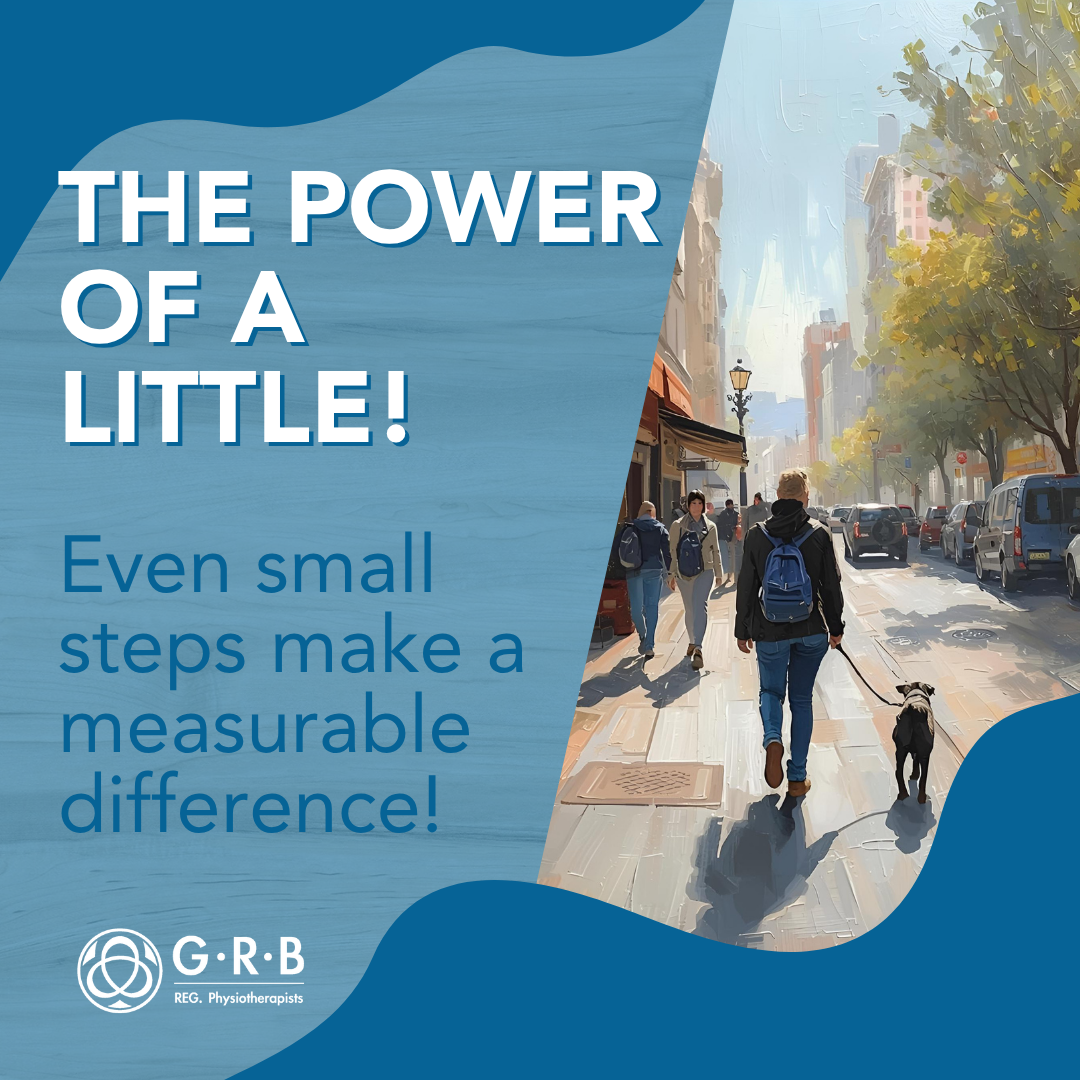The Power of a Little: Why Even Moderate Exercise Makes a Measurable Difference

At GRB Physio, we believe movement is medicine — and science agrees.
You don’t need to run marathons or spend hours in the gym to reap the benefits of exercise. The evidence is clear: even small amounts of regular activity have a measurable, lasting impact on your physical and mental well-being.
What the Evidence Shows
Research from the World Health Organization (WHO) and leading universities consistently shows that even modest activity — such as 20 to 30 minutes of walking a day — can significantly reduce the risk of chronic diseases like heart disease, diabetes, and stroke.
A large-scale British Journal of Sports Medicine review (Ekelund et al., 2023) found that people who completed just half of the WHO’s recommended 150 minutes per week still reduced their risk of premature death by nearly 20%.
It’s a reminder that “some” really is better than “none.”
Physical Benefits — Even in Moderation
You don’t have to be an athlete to feel the difference. Regular, moderate exercise helps to:
-
Improve cardiovascular health by strengthening your heart and circulation
-
Enhance muscle tone, posture, and balance
-
Support weight management and metabolic function
-
Boost immune function and reduce inflammation
-
Protect joints and bones, lowering the risk of osteoporosis
Even small sessions — 10 to 15 minutes — add up over time. Think of movement as investing in your future self.
Mental and Emotional Benefits
The benefits aren’t just physical. Exercise stimulates brain chemistry that reduces stress hormones (like cortisol) and boosts endorphins, which elevate mood and support mental clarity.
Regular movement has been shown to:
-
Reduce symptoms of anxiety and depression
-
Improve sleep, focus, and memory
-
Build resilience and emotional stability
As physiotherapists, we see how patients who move regularly — even in small doses — recover faster, cope better, and feel more confident in their daily lives.
For Health Professionals and Referrers
For our medical and allied colleagues, the evidence continues to grow.
Systematic reviews show that even modest increases in physical activity can:
-
Improve post-operative recovery and pain modulation
-
Enhance function in chronic low back pain, osteoarthritis, and cardiac rehab
-
Support psychological well-being, even in chronic disease populations
Encouraging patients to start where they are — with attainable, sustainable movement goals — can dramatically improve adherence and long-term outcomes.
Our Philosophy at GRB Physio
At GRB Physio, we’re passionate about empowering people to move well and move often.
Whether through tailored physiotherapy, guided exercise programs, or simple lifestyle advice, our goal is to help every person experience the benefits of movement — not just in recovery, but in life.
You don’t need perfection. You just need to start.
Because every step counts.
Take the First Step Today
If pain, stiffness, or uncertainty is holding you back, our team can help you find a safe, effective way to move again — based on your individual needs and goals.
012 664 6128
References
-
Lee, I.M. et al. (2012). Effect of physical activity on major non-communicable diseases worldwide: an analysis of burden of disease and life expectancy. Lancet, 380(9838), 219–229.
-
Sherrington, C. et al. (2019). Exercise for preventing falls in older people living in the community. Cochrane Database Syst Rev, (1):CD012424.
-
Swift, D.L. et al. (2018). The role of exercise and physical activity in weight loss and maintenance. Prog Cardiovasc Dis, 61(2), 206–213.
-
Nieman, D.C. (2019). Exercise, infection, and immunity. Int J Sports Med, 40(1), 1–9.
-
Zhao, R. et al. (2015). Exercise interventions and prevention of osteoporosis in postmenopausal women. Medicine (Baltimore), 94(50):e2211.
-
Rebar, A.L. et al. (2015). A meta-analysis of the effect of physical exercise on depression and anxiety in non-clinical adult populations. Health Psychol Rev, 9(2), 366–378.
-
Schuch, F.B. et al. (2016). Exercise as a treatment for depression: a meta-analysis adjusting for publication bias. J Psychiatr Res, 77, 42–51.
-
Erickson, K.I. et al. (2011). Exercise training increases size of hippocampus and improves memory. PNAS, 108(7), 3017–3022.
-
Gill, S.D. & McBurney, H. (2013). Does exercise reduce pain and improve physical function before hip or knee replacement surgery? A systematic review and meta-analysis. Arthritis Care Res, 65(12), 1991–2003.
-
Geneen, L.J. et al. (2017). Physical activity and exercise for chronic pain in adults: an overview of Cochrane Reviews. Cochrane Database Syst Rev, (1):CD011279.
-
Hayden, J.A. et al. (2021). Exercise therapy for chronic low back pain. Cochrane Database Syst Rev, (9):CD009790.
-
Taylor, R.S. et al. (2022). Exercise-based cardiac rehabilitation for coronary heart disease: Cochrane systematic review and meta-analysis. BMJ, 376:e068731.
-
Stubbs, B. et al. (2018). An examination of the anxiolytic effects of exercise for people with chronic illnesses: a systematic review and meta-analysis. Psychiatry Res, 266, 523–531.
